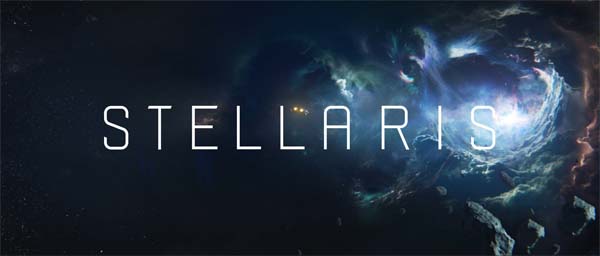
Last year, after my initial enthusiasm for Civilization VI began petering out (until the announcement of the expansion), I went on a bit of a space-4x bender. I spent some time with the rebooted Master of Orion. It was good, but I was underwhelmed by its limited scale and casual depth. I also planned on hitting up Endless Space 2. I played the first Endless Space briefly off-and-on, and I liked it, but kept getting diverted to other games and projects and never really allowed myself the time to get comfortable with the game.
But first, before diving into Engless Space 2, I wanted to tackle a game that's been in my library for over a year: Stellaris. This is an epic, space 4x strategy game developed by Paradox Interactive -- the same developer who brought us the infamously complex and detailed Europa Universalis and Crusader Kings series.
A gentler learning curve than Europa Universalis
I was hesitant to try Stellaris because of its relationship to Europa Universalis (and its notorious complexity), but I was surprised to find that Stellaris has a bit of a gentler learning curve. Instead of starting you out "in median res" with a developed European kingdom with armies already mobilized, alliances and rivalries already in place, and wars already in progress, Stellaris starts you out in control of a single planet in a single star system, with just a small fleet of corvettes, a construction ship, and a science ship at your disposal. You send your science ship to explore the other planets in your system, then on to the nearest star, and slowly explore from there at a much more comfortable pace that is akin to a game like Civilization or Master of Orion. Unlike with Crusader Kings and Europa Universalis, I didn't feel like I needed to sit down with a history textbook in order to know what was going on at the start of my game.
You start the game with a single science ship to explore your own star system, and work your way out from there.
Don't let this initial apparent simplicity fool you. Stellaris is still quite deep, quite complex, and the galaxy that you'll explore really does feel vast. While the Master of Orion reboot has galaxies with a mere dozens of stars (very few of which contain more than one or two planets), Stellaris features a default galaxy size consisting of hundreds of stars, most with their own planets, which might (in turn) contain moons.
There's still going to be some trial and error, as you'll make a lot of mistakes and miss a lot of opportunities in your first few games. If you left the "ironman" mode disabled, then you'll at least be free to re-load earlier saves and try to play better if anything goes horribly wrong. However, Paradox throws a bit of a curve ball at players by disabling achievements if you disable ironman mode. You won't stumble into achievements in your learning game(s) or by save-scumming; you'll have to earn them in the Ironman mode!
You also won't be able to manually save while in Ironman mode. You have to wait for the game to perform an auto-save (which I think happens every few in-game months, or maybe every year?). This can be very annoying if you don't notice the "saving game" popup and don't know if the game has saved your most recent actions. It's fine to include a single save file for this mode, but they could at least include a "Save and Exit" option in the pause menu! [More]
2caf8b87-93d3-4596-b06c-1db37d776061|0|.0
Tags:Stellaris, Paradox Interactive, strategy, grand strategy, 4x, science fiction, space, faster than light, hyperspace, wormhole, anomaly, research, terraforming, war, diplomacy, Master of Orion, patch, Skinner Box, Star Trek: Birth of the Federation
In my reviews of The Force Awakens and Rogue One, I complained about how the speed of communications and hyperspace travel seems to have shrunk the Star Wars universe. I asserted that the writers seem to have no appreciation for the size and scale of this universe, or for galactic conflict. That observation severely hurt my enjoyment of both films. Star Wars has always flown lose with its science, but even though the original trilogy got a lot of details wrong (ahem, "parsec"!), there at least seemed to be an effort to respect some scientific believability. Even the prequels stayed fairly respectful to the size and scale of the universe and conflict. The new movies, by comparison, seem completely (and deliberately) scientifically illiterate.
Keep in mind that the following analysis is coming from someone with only minimal knowledge of the extended universe. I'm more of a Trekker than a Star Wars fan (a "Warser"?). I have tech manuals of the Enterprise and the star charts of the Federation, but no Star Destroyer tech manuals or Imeprial star charts. So my opinions come from the films alone. Besides, all those novels, video games, and comic books have been de-canonized by Disney anyway. If anyone more knowledgeable of the Star Wars extended universe wants to chip in with corroborating or conflicting information, feel free to do so in the comments. Thanks to Disney's meddling, such knowledge may now be moot.
And oh, by the way, it drives me nuts when Star Trek movies make these sorts of mistakes as well. I'm looking at you, Star Trek V and first episode of Enterprise!
Hyperspace originally analogous to contemporary air travel
Let's start by looking at a frame of reference: the trip in the Millenium Falcon in the first Star Wars movie. While the Millennium Falcon is in transit from Tatooine to Alderan, Luke has time to receive some rudimentary Jedi training from Obi Wan, Han calmly relaxes and socializes in the lounge, and Chewbacca has time for at least one game of space-chess against the droids. This hyperspace trip is presented as being analogous to cross-continental (or intercontinental) plane flight: at least enough time for passengers to unfasten their safety belts and wander around the cabin.
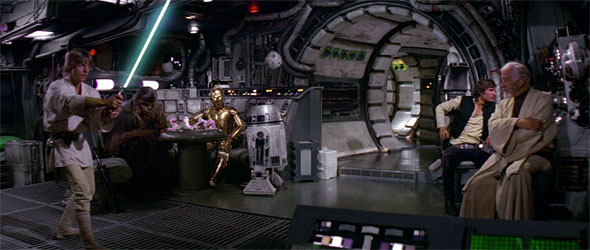
A hyperspace trip in the Millennium Falcon offers at least enough time for everyone to lounge about.
But an estimate of hours is on the low end of the spectrum of possibilities. As far as I can tell, there's nothing in the movie that negates the possibility of this trip to Alderaan taking days. That would certainly be plenty of time for Obi Wan to teach Luke enough of the basics of Force-sensitivity to enable his "lucky shot" in the climactic Death Star trench run. It would also give the characters enough time to socialize, converse and develop some sense of camaraderie with one another. It's also enough time for Leia to undergo at least a couple rounds of interrogation aboard the Death Star... [More]
26fb310b-edb8-4d45-99d9-16fdfa22b05a|2|5.0
Tags:Star Wars, Return of the Jedi, Star Wars: The Force Awakens, Rogue One: A Star Wars Story, hyperspace, faster than light, space, travel, distance, Tatooine, Alderaan, Endor, Battle of Endor, Scarif, Battle of Scarif, Millennium Falcon, airplane, World War II, Pearl Harbor, aircraft carrier
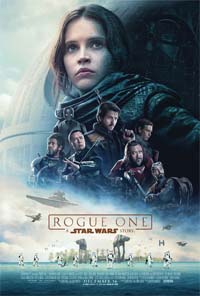
I don't think that Disney's writers take Star Wars' universe very seriously. I'm not talking about story or continuity; I'm talking about the actual, physical space in which the stories take place. They've created a major problem. It's the same problem that frustrated me about The Force Awakens: there is no sense of scale to this universe anymore. I was really hoping that it was just J.J. Abrams and his writing crew being lazy in Force Awakens because his Star Trek movies suffered from the same problem. I had hoped that a new writing crew would improve the material (just like Star Trek Beyond fixed another of my biggest complaints about the reboots of that franchise after J.J. left the helm). But that laziness seems to not only be contagious, but has actually gotten worse in Rogue One. This movie takes something that was only a nagging annoyance in Force Awakens, and blows it up to almost movie-breaking proportions.
In the original Star Wars movies, the time-frames for hyperspace travel was always ambiguous. There were cuts between scenes, and the amount of time that it took for ships to travel was left to the individual viewer's imagination. But now, we see interstellar travel and communications happen instantaneously, in real time! It happens when the fighter crashes on Eado, and the rebel base on Yavin immediately loses contact and sends a squad of fighters to assault the base. It happens again when Rogue One infiltrates the Imperial data warehouse on Scarif, a transmission is intercepted, and a rebel fleet immediately gets rerouted to the planet.
This isn't just bad science; it's also bad writing. The hyperdrive has become a narrative crutch. For the entire second half of the movie, I felt no tension at all because I knew that if the heroes ever got in a jam, a rebel fleet (or reinforcements) could just appear out of nowhere to save the day. This is a prequel, so I already knew how it was going to end. This lazy script contrivance (and all-around dull characters) also made the journey to get there completely uninteresting.
But it goes deeper. How far apart are these places? Is the entire galaxy that accessible?
Basic elements of the overarching Star Wars storyline just completely break down when travel and communication is instantaneous. There's no distinction between the tightly-controlled "core", and the supposedly-lawless "outter rim" planets if a whole fleet of Star Destroyers can literally FTL to any planet in a matter of seconds. There's no need for anyone to make a hard-copy of the Death Star plans to physically transport it if they can transmit the data instantly. And there's no point in pursuing or intercepting ships (such as Leia's Blockade Runner) if hyperspace travel takes the ship to its destination in a mere moment. The empire's holdings become completely indefensible if entire rebel fleets can appear out of nowhere with no warning. Their installations are publicly visible, but the rebels are hidden. The rebels know where all the imperial bases are, and there's nothing stopping them from just jumping to random bases and blowing them up with no recourse from the empire. This universe has lost the believable, lived-in quality and sense of breadth and variety that the original trilogy so expertly executed. The Star Wars universe is broken.
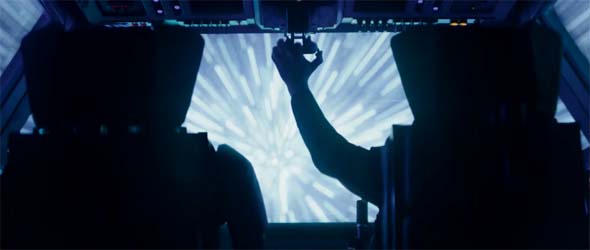
Rogue One shows us instantaneous communication and travel between planets in real time.
"Just turn off your brain and enjoy it", people tell me.
No. I won't turn off my brain. There is no reason why our movies can't be both entertaining and smartly-written. Why aren't we holding our movies to that standard anymore? It's not a tall bar. "Not as bad as the prequels" is not good enough, and I'm not going to pretend that it is when dealing with entries of a series that contains - not one - but two - landmark cinematic masterpieces.
Even if every new movie were as likable as The Force Awakens, these little missteps add up. Each new movie that comes out chips away at the integrity of the franchise (and universe) in which all the movies (including the good ones) exist. We can hand-wave away our complaints about the prequels, or we can ignore them entirely, but we're now at the point at which the original Star Wars trilogy is a minority of the Star Wars film franchise, and it's only getting more diluted. [More]
bed02b8d-cee1-484b-89cb-28dd57548f3e|1|5.0
Tags:Star Wars, Rogue One: A Star Wars Story, Disney, Lucasfilm, prequel, war, espionage, Death Star, Star Destroyer, space, galaxy, faster than light, hyperspace, Grand Moff Tarkin, Darth Vader, uncanny valley, Felicity Jones
F.T.L. ("Faster Than Light") is an indie game developed by Matthew Davis (programmer) and Justin Ma (artist) and released on Steam and GOG.com in September of 2012. It is a fast-paced starship strategy sim in which you manage a crew of rebels attempting to smuggle secret tactical information across the galaxy before an intergalactic Alliance can stop you and defeat the rebellion.
You use your F.T.L. drive to jump from warp beacon to warp beacon across randomly-generated sectors of space with the Alliance fleet in constant pursuit and must defend yourself from Alliance scouts, pirates, alien species, and the occasional non-conflict dilemma.
Table of Contents
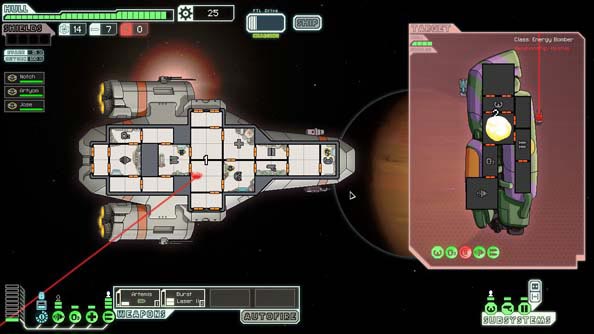
The bulk of the game consists of combat with hostile ships. [More]
|

| 12 | | | | | | | 60 | | 11 | | | | | | | 55 | | 10 | | | | | | | 50 | | 09 | | | | | | | 45 | | 08 | | | | | | | 40 | | 07 | | | | | | | 35 | | 06 | | | | | | | 30 | | 05 | | | | | | | 25 | | 04 | | | | | | | 20 | | 03 | | | | | | | 15 | | 02 | | | | | | | 10 | | 01 | | | | | | | 05 |
|